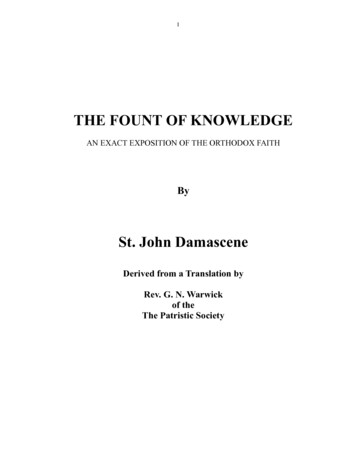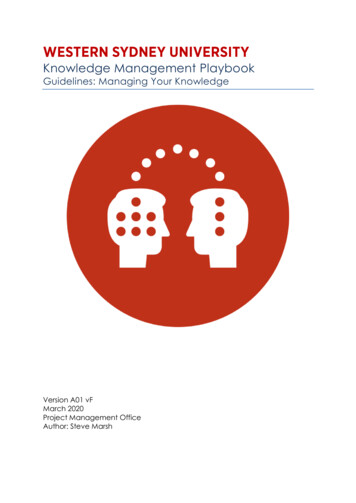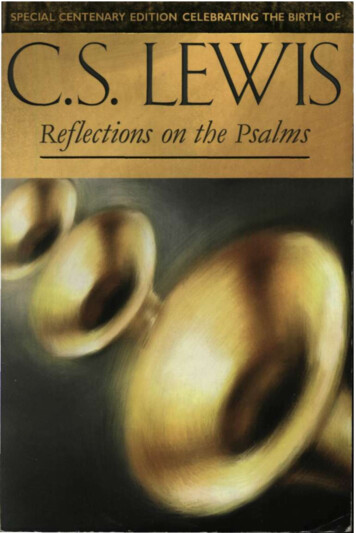
Transcription
1THE FOUNT OF KNOWLEDGEAN EXACT EXPOSITION OF THE ORTHODOX FAITHBySt. John DamasceneDerived from a Translation byRev. G. N. Warwickof theThe Patristic Society
2THE FOUNT OF KNOWLEDGEBySt. John DamascenePrefaceTHE MOST LOWLY MONK and priest John tothe most saintly and honoured of God, Father Cosmasthe most holy Bishop of Maiuma, greetings in theLord. Being fully conscious of the limitations of myintelligence and of the insufficiency of my language,your Beatitude, I have hesitated to undertake a taskexceeding my capabilities and to presume to enter intothe Holy of Holies like some bold and foolhardyperson, for I am wary of the danger that threatens thosewho attempt such things. The divine Moses, thelawgiver, withdrew from all sight of human things andabandoned the turbulent sea of life. He purified the eyeof his soul by wiping away every material reflection,and only then did he become fit to receive the divinevision. Only then was he found worthy to behold thebenevolent condescension of God the Word and Hismarvelous appearance in a bush and in immaterial fire,which, while it enkindled and burnt the tree andchanged it into His splendor, did not consume ordestroy it or alter its proper nature. He was the first tolearn the name of HIM WHO IS and who truly issuper-essential, and he was entrusted by God with theleadership of his own countrymen. Yet, if heconsidered himself as ‘having impediment andslowness of tongue —and thus unable publicly toexecute the divine will and to be appointed a mediatorbetween God and man—then how am I, who amdefiled and stained with every sort of sin, and who bearwithin myself the tumultuous seas of my conjectures,and who have purified neither my mind nor myunderstanding that they may serve as a mirror of Godand His divine reflections; how am I, who have notsufficient power of speech to express such concepts, toutter those divine and ineffable things which surpassthe comprehension of every rational creature? Withthese considerations in mind I have hesitated toundertake this book. Besides this, to tell the truth, Ifeared to accede to the request, lest I should incurridicule on the double count of ignorance and of folly.The latter is quite serious, for the charge of ignorancemay be excused—provided the ignorance is not fromlaziness; but to add to ignorance a false pretension toknowledge is serious, blameworthy, and quiteunpardonable, and it is a sure sign of a greater, if notthe greatest, ignorance. On the other hand, however,the fruit of disobedience is death, while the humble andobedient man, because he has shown himself to be animitator of Christ, is led from the lowest place to thehighest. He receives from God the grace thatilluminates, so that in the opening of his mouth he isfilled with the Spirit. He becomes purified in heart andenlightened in understanding. When he opens hismouth, he receives the power of speech and has noconcern as to what he shall say, because he is aninstrument of the Spirit speaking within him.Therefore, in obedience through you to the Christ whoin you exercises the pontifical office, I bow to yourrequest and open my mouth, being confident thatthrough your prayers it will be filled with the Spirit andthat I, taking so much as He shall give and speakingthis aloud, shall utter eloquently the fruit not of myown understanding but of the Spirit who givethwisdom to the blind.First of all I shall set forth the best contributions ofthe philosophers of the Greeks, because whatever thereis of good has been given to men from above by God,since ‘every best gift and every perfect gift is fromabove, coming down from the Father of lights. If,however, there is anything that is contrary to the truth,then it is a dark invention of the deceit of Satan and afiction of the mind of an evil spirit, as that eminenttheologian Gregory once said. In imitation of themethod of the bee, I shall make my composition fromthose things which are conformable with the truthand from our enemies themselves gather the fruit ofsalvation. But all that is worthless and falsely labeledas knowledge I shall reject. Then, next, after this, Ishall set forth in order the absurdities of the heresieshated of God, so that by recognizing the lie we maymore closely follow the truth. Then, with God’s helpand by His grace I shall expose the truth—that truthwhich destroys deceit and puts falsehood to flight andwhich, as with golden fringes, has been embellishedand adorned by the sayings of the divinely inspired
3prophets, the divinely taught fishermen, and the Godbearing shepherds and teachers—that truth, the gloryof which flashes out from within to brighten with itsradiance, when they encounter it, them that are dulypurified and rid of troublesome speculations. However,as I have said, I shall add nothing of my own, but shallgather together into one those things which have beenworked out by the most eminent of teachers and makea compendium of them, being in all things obedient toyour command. But I beseech you, Honoured of God,to be indulgent with me, who have been obedient toyour commands, and, receiving my obedience, to giveme in return of the abundance of your prayers.
4AN EXACT EXPOSITION OF THE ORTHODOX FAITHTHE BOOK ON PHILOSOPHYCHAPTER INothing is more esteemed than knowledge, forknowledge is the light of the rational soul. Theopposite, which is ignorance, is darkness. Just as theabsence of light is darkness, so is the absence ofknowledge a darkness of the reason. Now, ignorance isproper to irrational beings, while knowledge is properto those who arc rational. Consequently, one who bynature has the faculty of knowing and understanding,yet does not have knowledge, such a one, although bynature rational, is by neglect and indifference inferiorto rational beings. By knowledge I mean the trueknowledge of things which are, because things whichhave being are the object of knowledge. Falseknowledge, in so far as it is a knowledge of that whichis not, is ignorance rather than knowledge. Forfalsehood is nothing else but that which is not. Now,since we do not live with our soul stripped bare, but,on the contrary, have it clothed over, as it were, withthe veil of the flesh, our soul has the mind as a sort ofeye which sees and has the faculty of knowing andwhich is capable of receiving knowledge and havingunderstanding of things which are. It does not,however, have knowledge and understanding of itself,but has need of one to teach it; so, let us approach thatTeacher in whom there is no falsehood and who is thetruth. Christ is the subsistent wisdom and truth and inHim are all the hidden treasures of knowledge. Insacred Scripture let us hear the voice of Him who is thewisdom and power of God the Father, and let us learnthe true knowledge of all things that are. Let usapproach with attention and in all sincerity and proceedwithout letting the spiritual eye of our soul be dulledby passions, for even the clearest and most limpid eyewill hardly enable one to gain a clear view of the truth.‘If then the light that is in us (that is to say, the mind)be darkness: the darkness itself how great shall it be!With our whole soul and our whole understanding letus approach. And since it is impossible for the eye thatis constantly shifting and turning about clearly toperceive the visible object, because for clear vision theeye must be steadily focused upon the object observed,let us put aside every anxiety of the mind and approachthe truth unhampered by material considerations. Andlet us not be satisfied with arriving speedily at the gate,but rather let us knock hard, so that the door of thebridal chamber may be opened to us and we maybehold the beauties within. Now, the gate is the letter,but the bridal chamber within the gate is the beauty ofthe thoughts hidden behind the letter, which is to say,the Spirit of truth. Let us knock hard, let us read once,twice, many times. By thus digging through we shallfind the treasure of knowledge and take delight in thewealth of it. Let us seek, let us search, let us examine,let us inquire. ‘For every one that asketh, receiveth:and he that seeketh, findeth: and to him that knocketh,it shall be opened; and ‘Ask thy father, and he willdeclare to thee: thy elders in knowledge and they willtell thee.’ If, then, we are lovers of learning, we shalllearn much, for it is of the nature of all things that theymay be apprehended through industry and toil, andbefore all and after all by the grace of God, the Giverof grace.Furthermore, since the divine Apostle says: ‘Butprove all things: hold fast that which is good,’ let usalso find something in them worth carrying away andreap some fruit that will be of profit to our soul. Forevery craftman has need, also, of certain things for theprosecution of his works, and it is also fitting for thequeen to be waited upon by certain handmaidens. Solet us receive such sayings as serve the truth, while wereject the impiety which exercised an evil tyranny overthem. And let us not belittle that which is good. Nor letus use the art of rhetoric for the deception of simplerfolk. On the other hand, although the truth stands in noneed of the service of subtle reasonings, let usdefinitely use them to overthrow both those who fightdishonestly and that which is falsely calledknowledge.’And so, having invoked Christ as our Guide, thesubsistent Word of God by whom ‘every best gift andevery perfect gift” is given, let us make our beginningwith such principles as are adapted to those who arestill in need of milk. May those who happen upon thiswork have it as their purpose to bring their mind safelythrough to the final blessed end— which means to beguided by their sense perceptions up to that which isbeyond all sense perception and comprehension, whichis He who is the Author and Maker and Creator of all.‘For by the beauty of his own creatures the creator isby analogy discovered,’ and ‘the invisible things ofhim from the creation of the world are clearly seen,
5being understood by the things that are made.’ Thus, ifwe apply ourselves in a meek and humble spirit to theattainment of knowledge, we shall arrive at the desiredend. ‘You cannot believe in me,’ said Christ, who is thetruth, ‘if you receive glory from men,’ and, ‘every onethat exalteth himself shall be humbled; and he thathumbleth himself shall be exalted.”CHAPTER IIAnyone who begins something without a purposeis like someone fumbling in the dark, because he wholabors with no end in view is entirely at loose ends. So,then, let us state at the very beginning what theproposed purpose of this work is, so that what we areto say may more easily be grasped. Our purpose, then,is to make a beginning of philosophy and to set downconcisely in the present writing, so far as is possible,every sort of knowledge. For this reason let it beentitled a Fount of Knowledge. I shall say nothing ofmy own, but I shall set down things which have beensaid in various places by wise and godly men. First ofall, then, it is best to know just what philosophy is.CHAPTER IIIPhilosophy is knowledge of things which are in sofar as they are, that is, a knowledge of the nature ofthings which have being. And again, philosophy isknowledge of both divine and human things, that is tosay, of things both visible and invisible. Philosophy,again, is a study of death, whether this be voluntary ornatural. For life is of two kinds, there being the naturallife by which we live and the voluntary one by whichwe cling lovingly to this present life. Death, also, is oftwo kinds: the one being natural, which is theseparation of soul from body, whereas the other is thevoluntary one by which we disdain this present life andaspire to that which is to come. Still again, philosophyis the making of one’s self like God. Now, we becomelike God in wisdom, which is to say, in the trueknowledge of good; and in justice, which is a fairnessin judgment without respect to persons; and inholiness, which is to say, in goodness, which issuperior to justice, being that by which we do good tothem that wrong us. Philosophy is the art of arts andthe science of sciences. This is because philosophy isthe principle of every art, since through it every art andscience has been invented. Now, according to some, artis what errs in some people and science what errs in noone, whereas philosophy alone does not err. Accordingto others, art is that which is done with the hands,whereas science is any art that is practiced by thereason, such as grammar, rhetoric, and the like.Philosophy, again, is a love of wisdom. But, truewisdom is God. Therefore, the love of God, this is thetrue philosophy.Philosophy is divided into speculative andpractical. The speculative is divided into theology,physiology, and mathematics. The practical is dividedinto ethics, domestic economy, and politics. Now, thespeculative is the orderly disposition of knowledge. So,theology is the consideration of incorporeal andimmaterial things—first of all, of God, who isabsolutely immaterial; and then of angels and souls.Physiology, however, is the knowledge of the materialthings that are close at hand to us, such as animals,plants, stones, and the like. Mathematics is theknowledge of things which are in themselvesincorporeal but which are found in corporeal beings—such, I mean, as numbers and musical notes, and, inaddition, such things as geometrical figures and themovements of the stars. Thus it is that the logicalconsideration of numbers constitutes the science ofarithmetic; that of the musical sounds, music; that ofgeometrical figures, geometry; that of the stars,astronomy. These stand midway between things thathave bodies and things which have not, for, whilenumber is in itself incorporeal, it is also found inmaterial things, such as grain, for example, or wine, orany other such thing. Practical philosophy, moreover, isconcerned with the virtues. It governs manners andshows how one must behave in society. If it lays downlaws for the individual man, it is called ethics; but, iffor the entire household, then it is called domesticeconomy; while, if for cities and countries, then it iscalled politics.There are, however, some people who haveendeavored to do away entirely with philosophy byasserting that it does not exist and that neither does anyknowledge or perception exist. We shall answer themby asking: How is it that you say that there is neitherphilosophy, nor knowledge, nor perception? Is it byyour knowing and perceiving it, or is it by your notknowing and perceiving it? If you have perceived it,well, that is knowledge and perception. But if it is byyour not knowing it, then no one will believe you, aslong as you are discussing something of which youhave no knowledge.Since, then, there is such a thing as philosophy andsince there is knowledge of things that are, let us talkabout being. However, one should understand that weare beginning with that division of philosophy whichconcerns the reason and which is a tool of philosophyrather than one of its divisions, because it is used forevery demonstration. So, for the present, we shalldiscuss simple terms which through simple conceptssignify simple things. Then, after we have explainedthe meanings of the words, we shall investigatedialectic.
6CHAPTER IVBeing is the common name for all things whichare. It is divided into substance and accident.Substance is the principal of these two, because it hasexistence in itself and not in another. Accident, on theother hand, is that which cannot exist in itself but isfound in the substance. For the substance is a subject,just as matter is of the things made out of it, whereasan accident is that which is found in the substance as ina subject. Copper, for example, and wax are substance;but shape, form and colour are accidents. And a body isa substance, whereas colour is an accident. For thebody is certainly not in the colour; rather, the colour isin the body. Nor is the soul in knowledge; rather,knowledge is in the soul. Nor are the copper and waxin the shape; rather, the shape is in the wax and thecopper. Neither is the body said to belong to thecolour; rather, the colour to the body. Nor does the waxbelong to the shape; rather, the shape to the wax. Whatis more, the colour and the knowledge and the shapeare subject to change, whereas the body and the souland the wax remain the same, because substance is notsubject to change. Also, the substance and the matter ofthe body is just one thing, while there are manycolours. Similarly, in the case of all others things, thesubject is substance, whereas that which is found in thesubstance as in a subject is accident.Now, substance is defined as follows: Substanceis a thing which exists in itself and has no need ofanother for its existence. Accident, however, is thatwhich cannot exist in itself, but has its existence inanother. God, then, is substance, and so is everycreated thing. God, however, even though He issubstance, is super-substantial. There are alsosubstantial qualities about which we shall havesomething to say.CHAPTER VSince it is our purpose to discuss every simplephilosophical term, we must first of all know with whatsort of terms it is that philosophy is concerned. So, webegin our discussion with sound itself. A sound iseither meaningless or it has meaning. If it ismeaningless, then it signifies nothing; but if it has ameaning, then it signifies something. Then, again, ameaningless sound is either articulate or inarticulate.Now, that sound which cannot be written isinarticulate, whereas that which can be written isarticulate. Thus, for example, the sound made by astone or a piece of wood is an inarticulate andmeaningless one, because it is not written and has nomeaning. But such a sound, for example, as scindapsusis meaningless, yet articulate; for it can be written,although it does not mean anything, because therenever has been a scindapsus, nor is there any now.Now, philosophy is not concerned with themeaningless sound, whether it be inarticulate orarticulate. Again, the sound which has meaning iseither articulate or inarticulate. Thus, an inarticulatesound which does have meaning is one such as thebarking of dogs, because this sound, since it is thesound made by a dog, signifies the dog. It also signifiesthe approach of some person. It is, however,inarticulate, because it is not written. And so,philosophy is not concerned with this kind of soundeither. Now, the articulate sound which has meaning iseither universal or particular. Man, for example, isuniversal, whereas Peter and Paul are particular. It isnot with the particular term that philosophy isconcerned; rather, philosophy is concerned with thatsound which has meaning, is articulate, and isuniversal, or, in other words, common and predicatedof several things.Again, such a term is either essential or nonessential. Thus, that term is essential which signifiesthe essence, or, to be more precise, the nature, ofthings. On the other hand, that is non-essential whichsignifies the accidents. For example: Man is a rationalmortal animal. All of these terms are essential, for,should you remove one of them from the man, hewould no longer be a man. If you say that he is not ananimal, then, he is not a man. In the same way, if yousay that he is not mortal, then he is not a man, becauseevery man is at once animal, rational, and mortal. So, itis for this reason that these are called ‘essential,’namely, that they complete man’s nature, so thatwithout them it is impossible for the man to be a man.And similarly with every individual thing, thoseelements which go to make up the nature are calledessential. Non-essential, however, are the accidentswhich can be or not be in the subject—in a man, say, ora horse, or some such other thing. Take the colourwhite, for instance. Whether one be white or black, oneis by no means any less a man.Consequently, these and the like are non-essential,which is to say, they are accidents, and they or theiropposites may inhere in us. The essential term eithershows what a thing is or of what sort it is. Thus, forexample, when we are asked what a man is, we saythat he is an animal. Then, when we are asked whatsort of animal he is, we say a living and a mortal one.So, the essential term, which shows of what sortsomething is, is called difference. That term whichshows what something is either signifies severalspecies, in which case it constitutes the genus, or itsignifies several individuals differing from one anothernumerically but by no means specifically, in whichcase it constitutes the species. An example of theformer, that is to say, of genus, is substance. Substancesignifies both man and horse and ox, because each oneof them is termed a substance and is such, although
7each one is a different species. An example of thelatter, that is to say, of species, is man, because thisterm signifies several men, or, more exactly, allnumerically different men. Thus, Peter is one and Paulis another, and they are not one but two. In species,however, that is to say, in nature, they do not differ, forall are called men and are such.Consequently, there is that which is moreparticular and is numerically different, as, for example,Peter, an individual, a person, and a hypostasis. Thissignifies a definite person. For, when we are asked whothis man is, we say that he is Peter. The term ‘other’signifies the same thing, for Peter is one and Paul isanother. Likewise the terms ‘he,’ ‘this,’ and ‘that’—these and such others as stand of themselves areapplied to the individual. But that which includes theindividuals is called species and is more general thanthe individual, because it does include severalindividuals. An example would be man, because thisterm includes both Peter and Paul and all individualmen besides. This is what is called nature andsubstance and form by the holy Fathers. Now, thatwhich includes several species is called genus, anexample of which is animal, for this includes man, ox,and horse, and is more universal than the species.Moreover, both species and genus were called natureand form and substance by the holy Fathers.Furthermore, the species— that is, the nature and thesubstance and the form—does not produce somethingwhich is ‘other’ or something which is ‘of anothersort,’ but rather ‘another’ of the same sort. Thus, wemay say that by nature man is one thing and the horseanother, but we may not say that they are one andanother of the same sort. Speaking specifically, onesays ‘this,’ and ‘it,’ and ‘that,’ and the like, all of whichdeclare in what something is. The specific difference,however, constitutes something ‘of a different sort.’Thus, the rational animal is a thing of one sort, whilethe irrational animal is something of another sort. Thespecific difference furthermore constitutes ‘such’ athing, and ‘what kind’ of a thing, and ‘what sort’ of athing. The non-essential term may be applied either toone species or to several. If it applies to one, then it iscalled a property. For example, the property of laughterbelongs to man alone and that of neighing to the horsealone. If, however, it is to be found in several species,then it is an accident. Take whiteness, for example.This exists both in man and in the horse, and in the dogand many other species.Now, these are the five terms to which everyphilosophical term may be reduced. Accordingly, wemust know what each one means and what they have incommon with one another and in what they differ.They are genus, species, difference, property, andaccident.Genus is that which is predicated—that is,affirmed and expressed (for to be predicated is to beaffirmed in respect to something) —of several thingsthat are specifically different in respect to whatpertains to their essence. Species, on the other hand, isthat in which something is, but which is predicated ofseveral things that are numerically different. Anddifference is that which is predicated of several thingsspecifically different in respect to their particular sort,and it is included in the definition as essential. This isthat which cannot be and not be in the same speciesand cannot not be in the species to which it belongs.When present, it assures the existence of the species;when absent, the species is destroyed. Also, it isimpossible for it and its opposite to be in the samespecies. Thus, for example, the rational cannot not bein man, because that which is irrational is not man.When it is present, it constitutes the nature of man;when it is absent, it destroys it, because that which isirrational is not man. Now, one must know that this iscalled essential, natural, constituent, anddistinguishing, and specific difference, essentialquality, and natural property of a nature. It is veryproperly said by the philosophers to be a differencewhich is presentative of the nature possessing it andmost proper to this nature itself. A property is thatwhich exists in one species and in the entire species,and which is always in it and is conversely predicablewith it. Take, for example, the property of laughter.Thus, every man can laugh and everything that canlaugh is a man. An accident is that in which somethingis of a certain sort and which is predicated of severalthings differing in species but which does not enter intothe definition. It can either be or not be, for, whenpresent, it does not assure the existence of the species,and when it is absent, the species is not destroyed. It iscalled a non-essential difference and quality. It is eitherseparable or inseparable. That accident is separablewhich is sometimes present and sometimes absent inthe same hypostasis, as would be sitting, lying,standing, sickness, or health. That, on the other hand, isinseparable which is not constituent of a substancebecause it is not found in the entire species, but which,nevertheless, when it does become present in somehypostasis, cannot be separated from it. Such, forexample, are the having of a snub nose, being hooknosed, being gray-haired, and the like. This inseparableaccident is called a characteristic peculiarity. This isbecause such distinctiveness produces the hypostasis,which is to say, the individual—and an individual isthat which subsists in itself of substance and accidents,is numerically distinct from the others of the samespecies, and does not signify what but whom. In thefollowing we shall, with God’s help, learn moreaccurately about these things.
8CHAPTER VIDivision is the first section of the thing. Thus, forexample, the animal is divided rational and irrational.Redivision is the second section of the same thing. Forexample, the animal is redivided into apod, biped andquadruped—apod, as a fish; biped as a man or a bird;quadruped, as an ox, horse, or other such. Subdivisionis the section of the already divided-off branch. Forexample, the animal is divided into rational andirrational, and then the rational into mortal andimmortal. Now, the first thing is divided into twobranches: the rational and the irrational. It is thedivision of one of these branches, namely, the divisionof the rational into mortal and immortal, that issubdivision. Division and redivision are not used in allcases. However, when every thing is not covered bythe first division—as, for example, when the animal isdivided into rational and irrational, the biped is foundboth among the rational and the irrational animals—then of necessity we redivide, that is to say, we make asecond division of the same thing, and we say: ‘Theanimal is divided into apod, biped, and quadruped.For a similar reason, there are eight modes ofdivision. Thus, everything that is divided is dividedeither according to itself, namely, according tosubstance, or according to accident. If it is dividedaccording to itself, then it is either as a thing or as aterm. If it is divided as a thing, then it is either as genusinto species, as when you divide the animal intorational and irrational, or as species into individuals, asman into Peter and Paul and all other individual men,or as a whole into parts. This last division is twofold,being either into like or unlike parts. Now, a thing is oflike parts whenever its sections admit of the name andthe definition of the whole and of each other. Forinstance, when flesh is divided into several pieces,each portion is called flesh and admits of the definitionof flesh. On the contrary, the thing is of unlike partswhenever the part cut off will not admit either of thename or of the definition, whether of the whole or ofthe parts. Thus, should you divide Socrates into handsand feet and head, the foot cut off from Socrates wouldneither be called Socrates nor his head, nor would itadmit of the definition either of Socrates or of his head.Or division may be as that of an equivocal term into itsvarious meanings. This, again, is of two kinds, becausethe term may signify either the whole of something ora part of it. It may signify the whole, as does the word‘dog,’ since this last is used for land-dog, dog-star, andsea-dog, all of which are wholes and not part of ananimal. On the other hand, it may signify a part, aswhen the name ‘tongue’ is given to the top part of ashoe, to a part of the flute, and to the organ of taste inanimals, all of which are parts and not wholes.The foregoing are the modes in which a thing isdivided according to itself. When it is dividedaccording to accident, however, it may be divided assubstance into accidents, as when I say that some menare white and some black— for men are substance,while white and black are accidents. Or it may bedivided as an accident into substances, as when I speakof animate white things and inanimate white things—for the white is an accident, while the animate andinanimate things are substances. Or it may be dividedas an accident into accidents, as when I say that somecold things are white and dry, while others are blackand wet— for the cold and the white, the black, and thewet, and the dry are all accidents. There is still anothermode
the most holy Bishop of Maiuma, greetings in the Lord. Being fully conscious of the limitations of my intelligence and of the insufficiency of my language, . knowledge is serious, blameworthy, and quite unpardonable, and it is a sure sign of a greater, if not the greatest, ignorance. On the other hand, however, the fruit of disobedience is .










